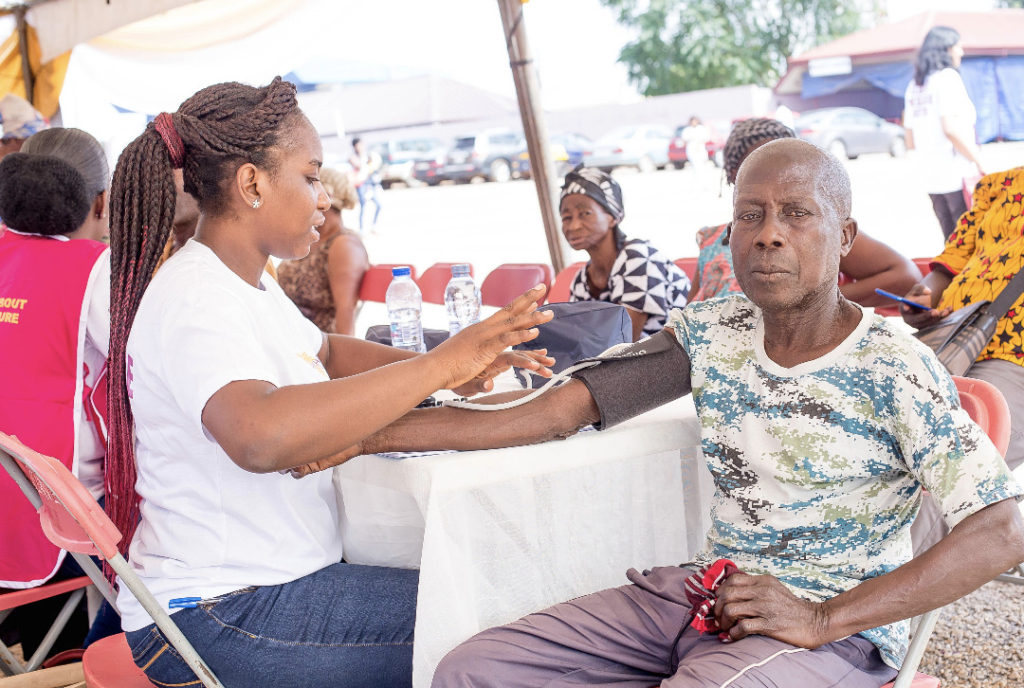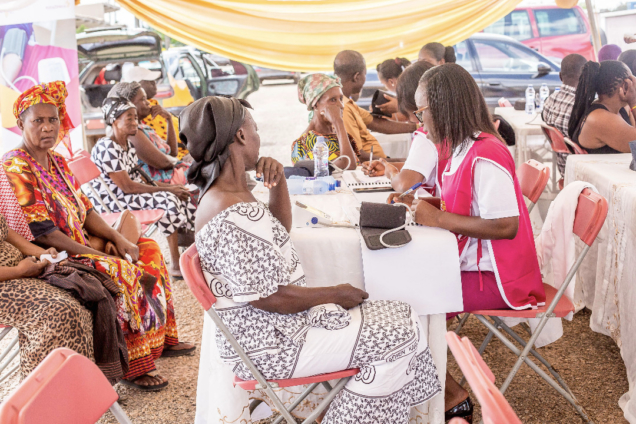AstraZeneca, the Ghana Health Service and PATH Ghana have marked the one-year anniversary of the launch of the Healthy Heart Africa programme in Ghana.
HHA has conducted over 275,800 blood pressure screenings in the community; identified over 44,500 elevated blood pressure readings and diagnosed over 10,200 people with high blood pressurei
Over the first year of implementation, the programme has conducted over 275,800 blood pressure screenings in the community; identified over 44,500 elevated blood pressure readings and diagnosed over 10,200 people with high blood pressure, contributing to national testing efforts.
The partnership seeks to contribute to the prevention and control of cardiovascular diseases (CVD) in Ghana with the emphasis on hypertension. In 2014, the Ghana Demographic and Health Survey reported a 13.0% prevalence of hypertension among persons aged 15 to 49 years.
Prevalence among male respondents was 12.1% and 13.4% among females. Among those who were diagnosed with hypertension, 45.6% were previously aware of their hypertension status, 40.5% were receiving treatment for the condition and 23.8% had their blood pressure controlled.
“Ghana Health Service has worked with the Healthy Heart Africa programme to increase awareness and demand for hypertension services by maximizing opportunities for screening and linking patients to care.

"On the occasion of the programme’s one year anniversary in Ghana, I wish to express our gratitude for the programme’s support in improving hypertension service delivery in the Ashanti Region and to emphasise the need to be aware of the dangers of elevated blood pressure, particularly in the wake of the Covid-19 pandemic, and to seek help when needed.
"Ghana Health Service will continue to support and commit to working in partnership with the Healthy Heart Africa programme to improve health outcomes for persons living with hypertension in the region and Ghana,” said Dr Patrick Kuma-Aboagye Director-General of the Ghana Health Service.
The programme is currently implemented in 35 facilities within seven districts of the Ashanti Region and has trained over 120 healthcare workersi to provide education and awareness, screening and treatment.
In addition, HHA has provided blood pressure screening equipment and patient education materials to improve on the quality of care.
“The importance of access to healthcare and strengthening local health systems resilience through training and guidelines has been spotlighted by the challenges that the global healthcare community is currently facing in managing the COVID-19 pandemic.
"I am pleased to mark one year of the implementation of the Healthy Heart Africa programme in Ghana, with the results demonstrating the work in partnership and commitment of local stakeholders to address the burden of Non-Communicable Diseases (NCDs).
"We commend the Ghana Health Service for their unwavering partnership and support, as we work together to contribute to the achievement of our shared goals to expand prevention of NCDs, raise health awareness and improve hypertension care in the country,” said Ashling Mulvaney, Global Head of Access to Healthcare, Global Sustainability, AstraZeneca.
Even though high blood pressure is a rising problem for populations in Ghana, national understanding and awareness of its prevalence, treatment and control is limited.
Working with community health nurses and community health volunteers, the HHA programme has integrated education on lifestyle modification and blood pressure measurement at the community level.
This strategy has extended reach to a larger number of people in a more cost-effective way and significantly contributed to the strengthening of community health systems.
“The COVID-19 pandemic has emphasized the urgency of strengthening access to care for NCDs. PATH has been pleased to implement this timely project in Ghana over the past year to improve access to hypertension detection and management.
"We appreciate AstraZeneca’s support that has allowed us to quickly contribute to the COVID-19 response in Ghana and protect people living with NCDs whilst strengthening access to care,” said Helen McGuire, Director Non- Communicable Diseases PATH.
Since launching in Kenya in 2014 and subsequently expanding to Ethiopia in 2016, Tanzania in 2018, Ghana in 2019 and Uganda in 2020, HHA has: iii
● Conducted over 15.09 million blood pressure screenings in the community and in healthcare facilities
● Trained over 7,290 healthcare workers, including doctors, nurses, community health volunteers and pharmacists to provide education and awareness, screening and treatment
● Activated 800 healthcare facilities in Africa to provide hypertension services
● Identified over 2.72 million people with elevated blood pressure.
Latest Stories
-
Livestream: 3rd edition of JoyNews Impact Makers Awards underway
1 hour -
I’ll be a coward if I heed to threats to back off galamsey fight – Dr. Hanna Bissiw-Kotei
2 hours -
Forestry Commission patrol team ambushed by armed illegal miners in Jimira Forest Reserve
2 hours -
UniMAC-FOJAMS holds staff-student consultative meeting with The Multimedia Group
3 hours -
Ghana–China Business Summit 2025 concludes
3 hours -
Akufo-Addo pushes for 30% sovereign reserves in African banks
4 hours -
Asantehene bemoans non-completion of 18-year-old stalled KNUST Teaching Hospital
5 hours -
MTN marks World MSME Day 2025 with call for digital inclusion and sustainable growth
5 hours -
Kwasi Kwarteng appointed Spokesperson for Kennedy Agyapong campaign
5 hours -
Inclusive, consultative appointment process will curb political animosity – Senyo Hosi on Asiedu Nketia’s criticism of EC
5 hours -
Youth-led summit ignites bold call for reform at 2025 African Governance and Anti-corruption gathering
5 hours -
If Torkornoo is cited for contempt, she brought it upon herself – Lawyer
5 hours -
Victoria Bright urges truth and accountability following Asiedu Nketia’s criticism of EC
6 hours -
Razak Kojo Opoku rejects efforts to tie Bryan Acheampong to 2014 Alhaji Bature article
6 hours -
Herman Suede and The Therapist reunite for “One by One II”
6 hours

